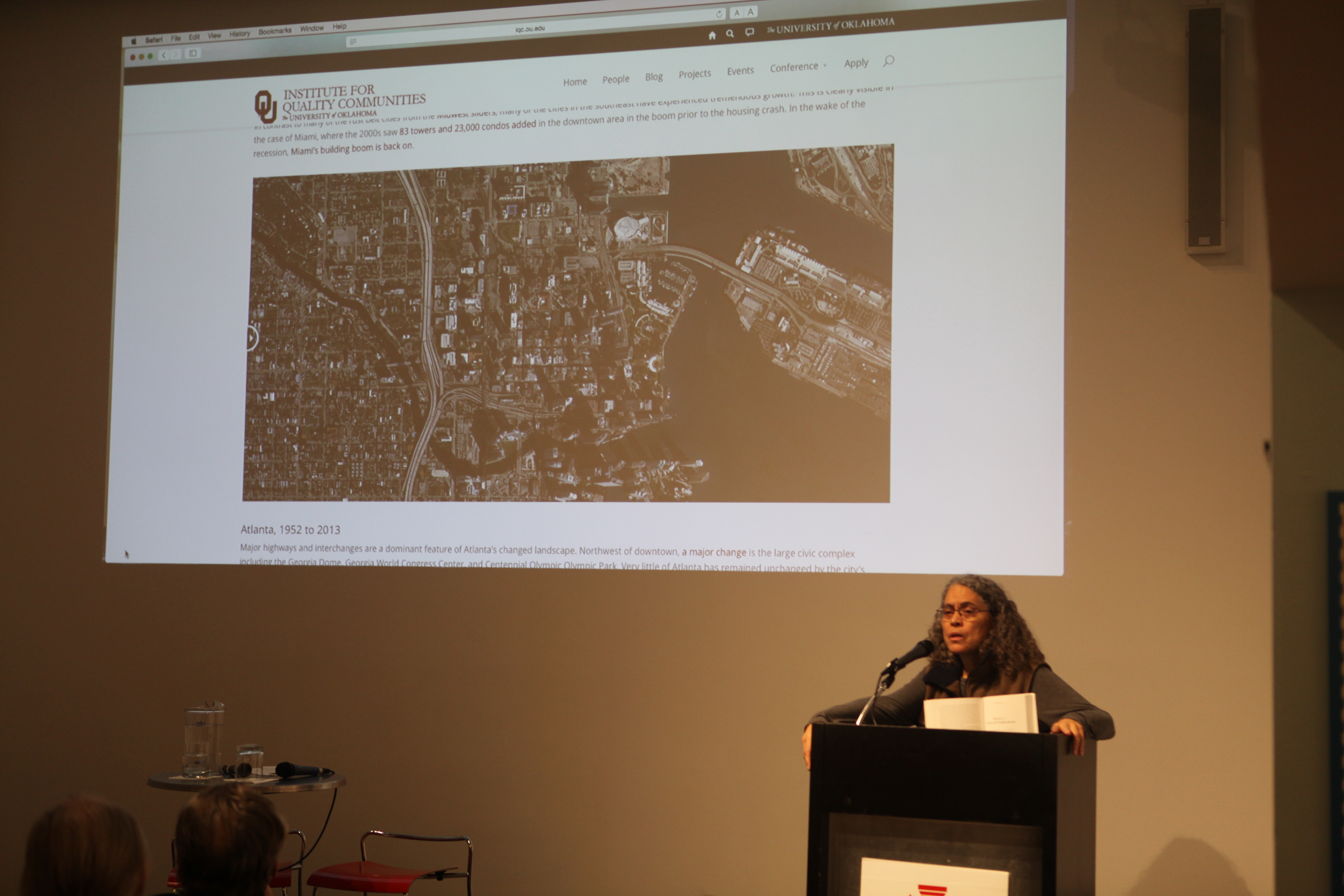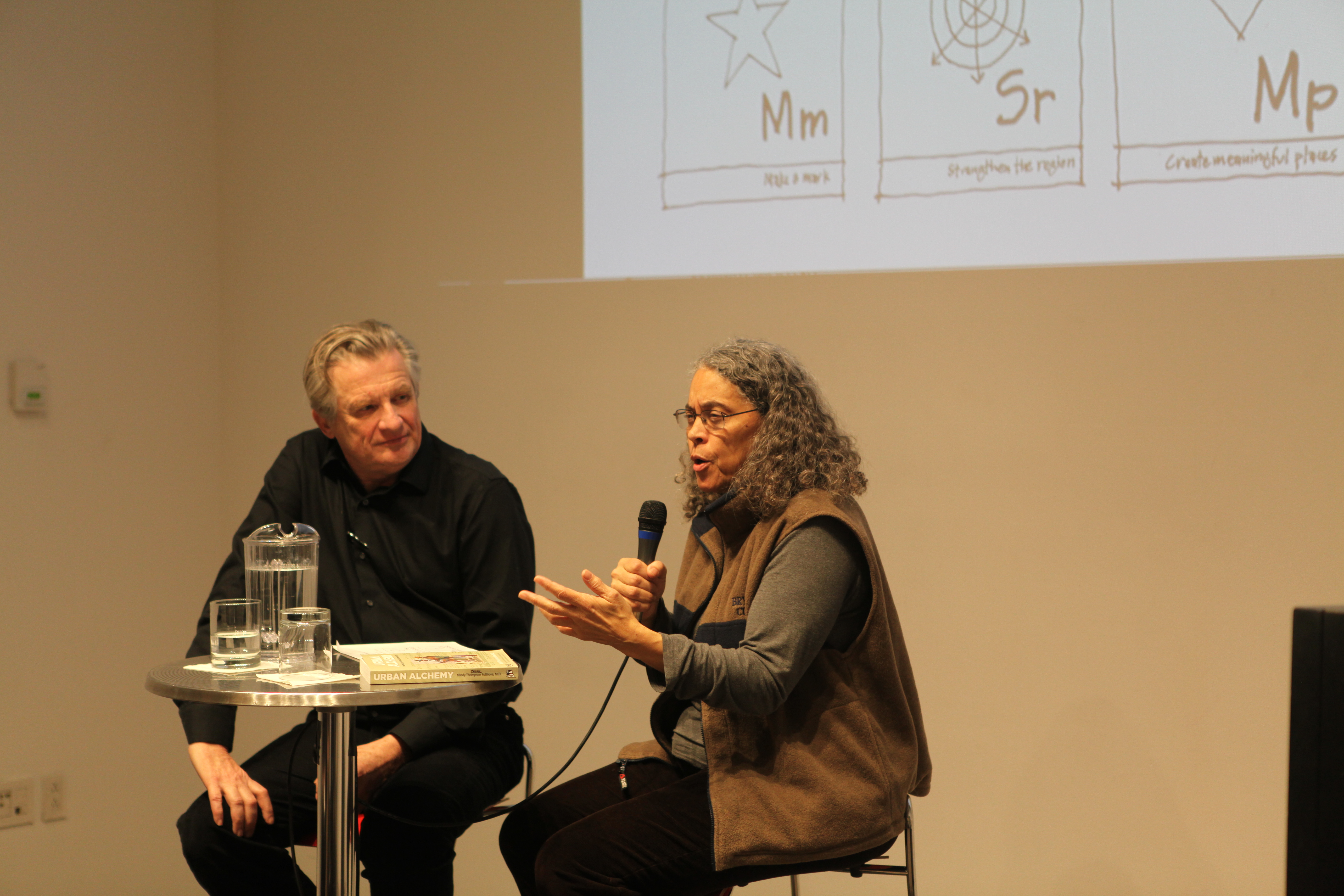by: ac
Urban Alchemy: Restoring Joy in America’s Sorted-Out Cities is fundamentally a healthy book about urbanism, written by clinical psychiatrist Mindy Thompson Fullilove, MD. The book’s analysis is a practice of hands-on urbanism worked through the lens of Fullilove’s research on public health issues in distraught urban areas. Organized in nine elements meant to heal broken cities, the book is actually a collection of bright and joyous urban tales played out by Fullilove, an exuberant storyteller. The nine points are measurements prescribed by Fulliliove’s mentor and colleague, urbanist Michel Cantal-Depart. Jean Nouvel, Hon. FAIA, writes in the introduction of Cantal-Depart’s magpie demeanor and ability to “map” the terrain of a new project/city not just abstractly, but spiritually.
Fullilove fills her text with, at face value, case studies, but she leaves the messy threads of change in the narrative. Her willingness and ability to go back again and again to various neighborhoods and cities is invaluable, and makes the design professional question the length of engagement when working with communities. Each case study had an interesting physical boundary to grapple with, whether it was a steep hill or an expressway dislocating the place from the rest of the city. Fullilove establishes this condition as a city being “sorted-out.” These physical boundaries create inequality in the mechanism of a city. The impact of this dislocation is evident in her analysis of the consequence of the Berlin Wall. Although not a “project” that she worked on, the history of the wall, its fall, and the subsequent high-value development is an epic and graphic illustration of what development can do to cities, and how it can make residents physically ill. The inclusion and analysis is a perfect touchstone for even the smallest urban problem.
Fullilove’s interest is in urban restoration and, with ample amounts of energy, she employs both clinical psychiatry as well as a design professional’s methods. Her description of the use of a sketchbook in her work is lovely, and brings to mind that first magic sketchbook used as an early design student, the one where one wrote in every page and all your thoughts were recorded and manifested in the design. The book has too few illustrations, created by Sarah Schell, that are remarkably clear and devoid of architectural obfuscation. The text is an example of the power of personal engagement in communities. Her work in Orange, New Jersey, made me want to run out and get day-glow paint to apply in under-designed urban areas, and her “working walks” up to Harlem’s Highbridge illustrate the intimacy of small acts that are at the heart of “thinking like a city.” In fact, the idea of “thinking like a city” was a revelatory expression for me. Discussions of American urbanism still too often rely on “the city” as a pejorative term. Fullilove’s act of “unslumming” is the first active example of Jane Jacobs’s urbanist tenet, and is so appreciated. Her experience of practicing holistic urbanism is a guide to all designers.
The book has some flaws. The structure is sometimes confusing, jumping from France to Pittsburgh and back. Her many cohorts and colleagues are hard to follow, labeled by changing acronyms and varying degrees of prominence in projects. Still, Michel Cantal Depart’s appearances as a “city whisperer” never disappoint.
Fullilove presented her book at the January Oculus Book Talk at the Center for Architecture. William Moorish, professor of Urban Ecologies at Parsons The New School for Design, was the respondent. As teaching colleagues at Parsons, the chat was a comfortable discussion of the value systems that both Fullilove and Morrish overlay on urban questions. Most remembered and affirmed by Fullilove’s work is Morrish’s “deciding to stay” tenet. The idea that inhabitants of blighted urban communities can rethink their own landscape, see the positive, and then establish even better communities by staying in the neighborhood illustrates the joy and resolve that these two practitioners put forth. The delight they took in the work they do together brings to mind Fullilove’s comment, “Having a party is, of course, the goal of good urbanism.” The book, as well as the Oculus Book Talk, reminds one revelling in urban questions is the key to change.
Want more? See a video of the lecture on our Vimeo page.
Annie Coggan is a principal with Coggan and Crawford Architects, and teaches at the Fashion Institute of Technology and the School of Visual Arts in New York City.
Event: Oculus Book Talk: Urban Alchemy
Location: Center for Architecture, 01.12.15
Speakers: Dr. Mindy Thompson Fullilove, Professor of Clinical Studies of Sociomedical Sciences, Columbia University Mailman School of Public Health; William Morrish, Professor of Urban Ecologies, Parsons The New School for Design; and Rick Bell, FAIA, Executive Director, AIANY | Center for Architecture (introduction)
Organizers: AIANY Oculus Committee
Oculus Book Sellers: McNally Jackson Books









